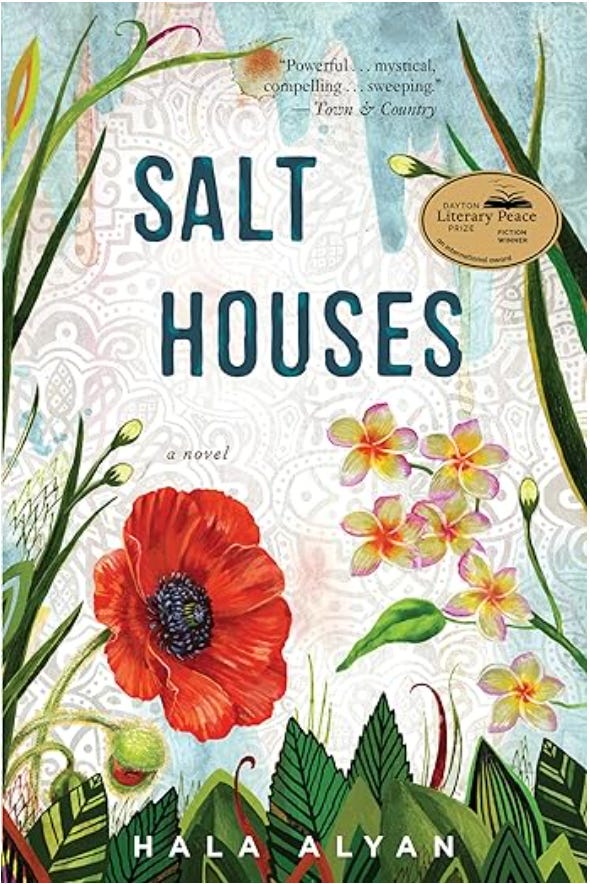Though I’ve been deeply troubled by the events playing out in the Gaza Strip since October 7th, I didn’t plan to make a study, mostly by way of fiction, of life in Israel and the occupied territories. But one book led to another and I keep finding myself hungry for more.
Salt Houses by Hala Alyan tells the story of four generations of the Yacoubs, a politically moderate, well-to-do Palestinian family whose lives are uprooted again and again due to war and unrest. We meet them first through Salma, a widow now living in Nablus whose late husband Hussam…
“…fiercely believed his illness was tied to the occupation of Jaffa, the city with the peach-colored house they’d left behind.”
The book opens in 1963, the eve of her daughter Alia’s wedding, and performing the ritual reading of the bride-to-be’s coffee dregs, Salma “…knows instantly she must lie.”
"There it is. She had not been mistaken. The porcelain surface of the teacup is white as salt; the landscape of dregs, violent."
Alia’s life does turn out to be difficult. Happiness with her husband Atef, her beloved, charismatic brother Mustafa nearby, ends abruptly in 1967 when both men are called to serve in the Six Day War. Alia is forced to flee to her sister’s home in Kuwait. Salma joins her sisters in Amman, Jordan.
Mustafa doesn’t make it back. Irtek does but he accepts a job in Kuwait despite Alia’s longing for home. They raise their three children there—Riham, Karam, and Souad—until the family flees to Beirut and beyond when Saddam Hussein invades Kuwait during the Gulf War.
I don’t want to give too much away. It’s the unfolding of this story in the points of view of various family members that I found so compelling. The way—as in real life—traits and features of family members appear in children and grandchildren, sometimes creating alliances, sometimes the opposite. How one generation’s banishment to a place they can never love creates the home their children will long for when war banishes them to an unfamiliar place. How closely-knit families splintered by war also splinter in same ways ordinary families do.
How they come back together again.
To give you a feel for this beautifully written novel, here are a few snippets I particularly admired:
“Their marriage had a glove compartment, a hollow, cluttered space where emotional debris went.”
“And she feels not love but detachment, an odd calmness as she watches him, as if she’s appraising a house she’s not sure she wants to live in.”
“He looks like a surly prince from a former era, the beard stark on his young, delicate face.
“Atef understanding that he is changing their lives, these children who will take this moment and make something of it, turn it into their own lives, remember on their deathbeds, the cool air, the stars, their grandfather weeping under a fig tree.”
“But Mustafa, we still thirst for it. Our mutiny is remembering.”
While leading me to a deeper understanding of the Israeli Palestinian conflict, so many of the books I’ve read recently have left me feeling angry and in despair. Salt Houses isn’t an easy read; no novel that tells the truth about the world we live in is. But it offers hope in its depiction of a family whose losses are unimaginable to most of us making and remaking home wherever they are.
Thanks for reading Book Pilgrim!





Thank you!
I totally get that! The history--on all sides--is a heartbreak. Thanks for reading. XX